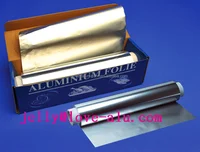Even if at the moment we lack scientific evidence to say that aluminum foil can influence the appearance of certain diseases, countries like France, Belgium, Germany, the United Kingdom or Brazil have prohibits its use for food purposes. With the aluminum foil container machine now you can come up with the best deals now.
- For lunch whether at work or outside it is protected, most of the time, in a rigid plastic box or in aluminum foil. However, we often hear that household aluminum foil would have a much greater impact on the environment than other packaging.
- This assessment therefore compared the two types of packaging. The baseline scenario weighed the environmental impact of household aluminum foil and all of its production and disposal elements against that of a reusable plastic box washed in an energy-efficient dishwasher.
Since the plastic box is a reusable solution, the comparative study considers that the impact of the manufacturing process plays only a negligible role throughout the life of the box. On the other hand, household aluminum foil is a disposable product, and the manufacturing processes as well as the associated consumption of energy resources must be considered. A number of cases have been studied: various thicknesses of aluminum foil, various numbers of sandwiches and different detergents used for dishes.
Different environmental impact criteria have been taken into account:
Climate change, acidification, photochemical formation of ozone, eutrophication of terrestrial and aquatic ecosystems and toxicity to humans. But also the total demand for primary energy and the demand for non-renewable primary energy and finally water consumption.
In all cases and for the majority of the criteria studied, household aluminum foil has environmental impacts equal to or less than those of the plastic box. Thus, washing a plastic sandwich box is at least as damaging to the environment as using a new piece of aluminum foil correctly sized for the contents performing the same function.
Despite this, aluminum foil suffers from a poor image and is even banned in some nurseries and schools in several European countries. This is mainly due to the waste that this type of non-reusable packaging entails. On the other hand, the reusable sandwich box or bowl made of rigid plastic is generally considered to be environmentally friendly. However, the results of the IFEU study prove the opposite, even considering that aluminum, once used, is not recycled.
Aluminum foil is 100% recyclable.

In some countries, household aluminum foil can be thrown away with packaging and follows the corresponding recovery path, which can be recycling materials or producing energy. In other countries, it is thrown away with household waste.
Aluminum foil is not recycled and goes, with household waste to incineration or to landfills. In fact, sorting centers are not equipped to sort these small packages. Result: only 32% of aluminum was recycled in 2012. This situation is all the more unsatisfactory as the industrial aluminum recycling sector lacks material to recycle, underlines the Light Packaging Club in aluminum and steel, in the Environment & Technical magazine.
Aluminum: what are the health risks?
In addition, there is a certain distrust of aluminum which, in high doses, is detrimental to health. Indeed, several studies suggest that aluminum has a neurotoxicity which can lead to Alzheimer’s disease as well as other neurodegenerative diseases such as Parkinson’s disease.
